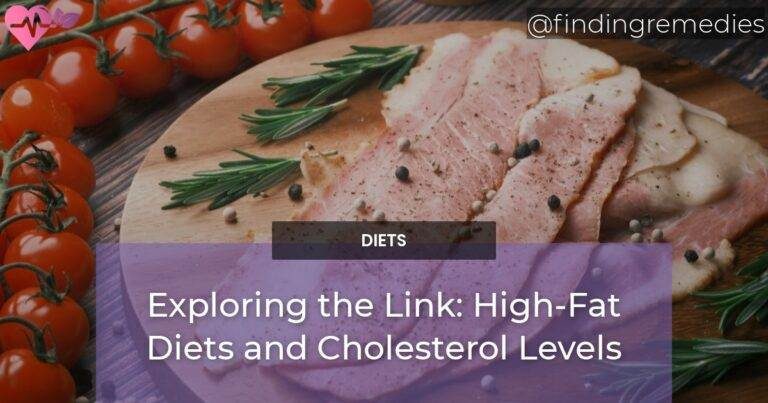High-fat diets have been a topic of debate in the nutrition and health care industry for a long time. Some people swear by their benefits, while others warn of their potential risks.
In this article, we will take a closer look at the relationship between high-fat diets and cholesterol and see if it can affect cholesterol levels, both positively and negatively, and explore the relationship between high-fat diets and heart disease.
Table of Contents
Health Benefits of a High-Fat Diet
Possible Benefits of a High-Fat Diet
Contrary to popular belief, a high-fat diet can have some health benefits. Here are some of the ways a high-fat diet can be beneficial:
- Weight loss: High-fat diets can help you lose weight by reducing your appetite and increasing your metabolism.
- Insulin resistance: A high-fat diet can improve insulin resistance, a condition that can lead to type 2 diabetes.
- Metabolic syndrome: A high-fat diet can help reduce the risk of metabolic syndrome, a cluster of conditions that include high blood pressure, high blood sugar, and excess body fat.
- Inflammation: High-fat diets can reduce inflammation in the body, which is linked to many chronic diseases.
- Nutrient absorption: Fat-soluble vitamins like A, D, E, and K are better absorbed with fat.
- Omega-3 fatty acids: High-fat diets that include healthy fats like omega-3s can reduce the risk of cardiovascular disease.
ALSO READ
How High-Fat Diets Can Affect Cholesterol Levels
High-fat diets can have a significant impact on cholesterol levels. Cholesterol is a fatty substance that is found in the blood and is essential for several bodily functions. However, too much cholesterol can increase the risk of heart disease.
Can High-Fat Diets Improve Cholesterol Levels?
While high-fat diets can increase cholesterol levels, they can also improve cholesterol levels in some cases. Here are some ways how:
- Reduce triglycerides: High-fat diets can lower triglycerides, a type of fat found in the blood that can increase the risk of heart disease.
- Increase HDL cholesterol: High-fat diets can increase HDL cholesterol, the good cholesterol that helps remove LDL cholesterol from the bloodstream.
- Reduce LDL particle size: High-fat diets can reduce the size of LDL particles, making them less harmful.
Risks and Side Effects of a High-Fat Diet
Increased Risk of Heart Disease
One of the most significant risks of a high-fat diet is an increased risk of heart disease. High-fat diets can lead to high cholesterol levels, which can increase the risk of heart disease.
Increased Risk of Stroke
High-fat diets can increase the risk of stroke by contributing to the build-up of plaque in the arteries.
Increased Risk of Type 2 Diabetes
While high-fat diets can improve insulin resistance, they can also increase the risk of type 2 diabetes in some cases.
Weight Gain
High-fat diets can be high in calories, which can lead to weight gain if not managed properly.
Increased Risk of Certain Cancers
Some studies have linked high-fat diets to an increased risk of certain cancers, such as breast and colon cancer.
Increased Risk of Gallbladder Disease
High-fat diets can increase the risk of gallbladder disease by contributing to the formation of gallstones.
ALSO READ
Can a High-Fat Diet Lead to Heart Disease?
How High-Fat Diets Affect the Heart
High-fat diets can increase the risk of heart disease by contributing to high cholesterol levels, high blood pressure, and inflammation.
Relationship between High-Fat Diets and Heart Disease
While high-fat diets are not the sole cause of heart disease, they can contribute to its development. It is essential to maintain a balanced diet that includes healthy fats in moderation.
How Does a High-Fat Diet Affect Cholesterol Levels?
Types of Cholesterol
There are two types of cholesterol: LDL cholesterol (the bad cholesterol) and HDL cholesterol (the good cholesterol).
High-Fat Diets and LDL Cholesterol Levels
High-fat diets can increase LDL cholesterol levels, which can increase the risk of heart disease.
High-Fat Diets and HDL Cholesterol Levels
High-fat diets can increase HDL cholesterol levels, which can help reduce the risk of heart disease.
Are There Any Negative Effects of a High-Fat Diet on Cholesterol Levels?
How High-Fat Diets Affect Cholesterol Levels
High-fat diets can increase cholesterol levels, but the effects can vary depending on the type of fat consumed.
The Role of Saturated and Unsaturated Fats in Cholesterol Levels
Saturated fats can increase LDL cholesterol levels, while unsaturated fats can reduce LDL cholesterol levels.
The Importance of a Balanced Diet in Maintaining Healthy Cholesterol Levels
It is essential to maintain a balanced diet that includes healthy fats in moderation to maintain healthy cholesterol levels and reduce the risk of heart disease.
Overall, high-fat diets can have both positive and negative impacts on cholesterol levels. It is essential to maintain a balanced diet that includes healthy fats in moderation and consult with a healthcare professional before making any significant changes to your diet.
RELATED ARTICLES:

